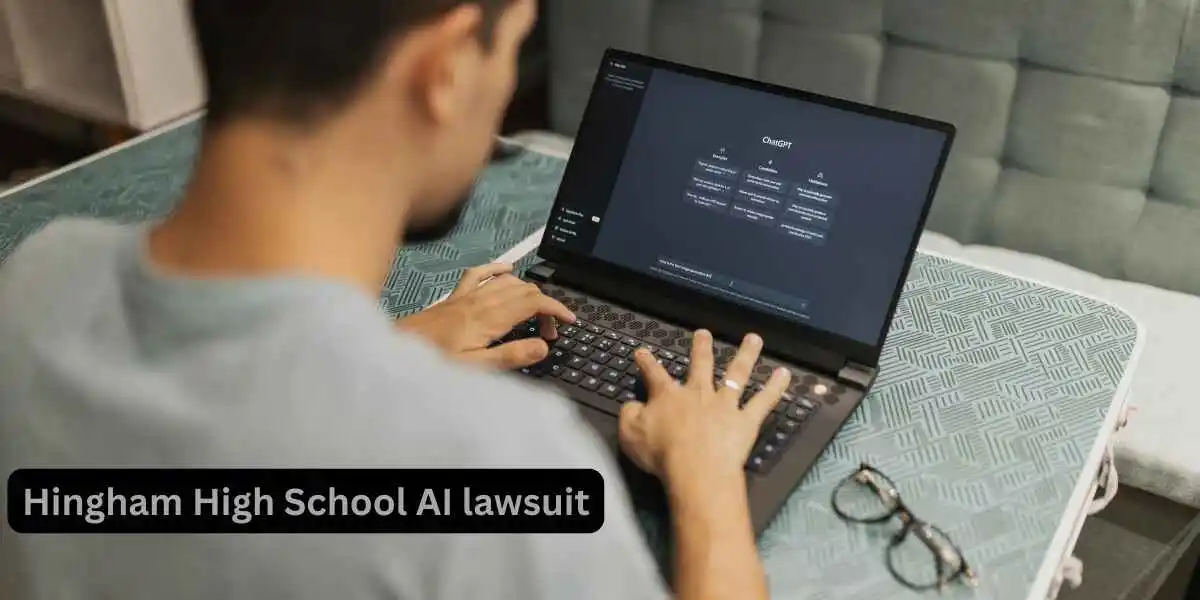The Hingham High School AI lawsuit has become a defining decision in the current debate about the way artificial intelligence (AI) affects education. This lawsuit aims to challenge how schools are able to identify and respond to their use of AI tools for students, with a particular focus on fairness as well as the integrity of academics.
As writing apps powered by AI like ChatGPT are becoming more popular, schools such as Hingham High are forced to revisit their rules. This case reveals the difficulties of finding AI usage, ensuring students’ rights, and adjusting ethics policies in a world dominated by AI.
The article will look at the effects of AI on education and student rights concerns in AI investigations, as well as the shortcomings in AI detection tools, in addition to the future of academic honesty by looking through the lens of the Hingham High School AI lawsuit. Additionally, you’ll get an easy step-by-step guide on how to help navigate AI investigation and use in schools.
AI in Education: Understanding Its Role and Challenges
AI has revolutionised learning by introducing new tools for writing, research, and solving problems. The Hingham High School AI lawsuit illustrates the rapid expansion of AI in schools and how it has impacted conventional approaches to academic transparency.
On the other hand, AI helps students come up with ideas or improve their writing. However, there are students who use these tools to create essays or even answers, which raises worries among educators.
In one instance, one student at Hingham was alleged to have submitted AI-generated content without proper attribution. The school employed AI detection software to alert the student, resulting in discipline. The incident triggered a larger discussion regarding how schools can react to AI usage in a fair way.
Student Rights and AI Investigations at Hingham High School
The central issue in the high school of Hingham in the AI suit concerns the defence of the rights of students during AI-related investigations.
A lot of students are concerned that schools rely too much on automated tools and do not give the tools a fair opportunity to justify their actions. The suit claims that Hingham High’s system was in violation of pupils’ due process rights that protect them from unfair or unjustifiable punishment.
For example, a student identified as Emily (name changed for privacy) was stunned when her essay was identified in the eyes of the AI detector. The student wasn’t provided with an explanation in writing or given the opportunity to argue her case. The lack of transparency contributed to the legal battle and a call for schools to create specific guidelines for AI investigation, which include human review and transparent communication.
Reliability of AI Detection Tools: Challenges Highlighted by the Lawsuit
The Hingham High School AI lawsuit also highlights the shortcomings that are inherent to AI detection software, such as GPTZero or Turnitin AI recognition.
These programs analyse patterns in text to determine if the content was artificially generated. But false positives are quite common; well-written or original student essays could be classified by the software as AI work. This could have dire implications for students.
The case raises important questions regarding the reliability of AI detectors and whether schools can rely solely on them to make discipline choices.

Future of Academic Honesty Policies in an AI World
The outcome of the Hingham High School AI lawsuit is likely to influence how all schools modify their policy on academic integrity to combat AI.
Experts recommend a balanced approach that combines the automated AI recognition with human judgement, gives students the chance to discuss their work, and informs everyone about the ethics of AI use.
Schools may also establish explicit guidelines for the manner and when AI tools can be utilised as part of the assignments, creating an environment that promotes the development of knowledge and a sense of integrity.
Step-by-Step Guide: How to Navigate AI Use and Student Rights
No matter if you’re a teacher, student teacher, or parent, here’s a helpful guide that is based on the Hingham High School AI lawsuit:
- Get educated on AI tools. Know what AI writing aids and AI detection software can do.
- Be aware of your school’s policies. Check out the rules of academic honesty that relate to AI use.
- Keep a record of your efforts. Note down draft notes, outlines, and notes as evidence of your initial effort.
- Request transparency. If you are accused, you are accused; request details about the evidence and procedure used.
- Responsibly utilize AI. Consider AI as an instrument that can aid your learning and not replace your own concepts.
- Appeal, if required. Be aware of your rights to appeal the decisions of your judge and seek an impartial review.
The reason the Hingham High School lawsuit involving AI is Important for everyone
This lawsuit is a pivotal moment in the evolution of education’s relationship with technology. The lawsuit challenges schools to find the most fair, ethical ways to deal with AI usage that respect student rights and academic integrity.
Through the lessons learnt from the high school in Hingham that was involved in the AI lawsuit, communities can advocate for policies that acknowledge the possibilities of AI without jeopardising fairness or confidence in the field of education.
As AI grows, being informed and active will help students, teachers, and parents navigate the new technology successfully.
References and Further Reading:
- ChatGPT by OpenAI
- GPTZero AI Detection
- Turnitin AI Detection
- Understanding Due Process in Schools
- Academic Integrity in the Age of AI

